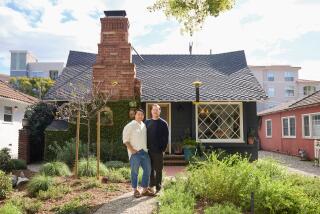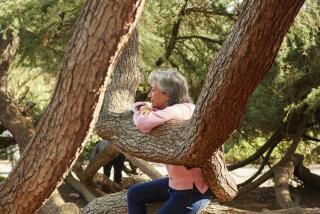Feng Shui Has a Place Outdoors
- Share via
The adage “a place for everything and everything in its place” has added relevance for adherents of feng shui, an ancient Chinese philosophy that’s becoming better known in Orange County.
Feng shui originated in southern China 2,000 years ago. The words mean “wind” and “water,” and the philosophy concerns the art and science of placement, the relationship between us and our environment.
It focuses on how cosmic energy, called chi, can best be used to increase health, prosperity and good luck. Evolving from the concept that we are affected, for good or ill, by our surroundings, the aim of feng shui is to change, balance and harmonize the environment, be it home, workplace or even the garden.
Bridget Skinner is a Newport Beach landscape designer who has been studying feng shui for five years.
Although Skinner has helped clients change home interiors, she specializes in applying feng shui to garden design.
“To me, feng shui is about good design,” said Skinner, a certified feng shui practitioner from the Feng Shui Institute of America. She completed the practitioner training program at the Western School of Feng Shui, founded by Terah Kathryn Collins, author of “The Western Guide to Feng Shui” (1996, Hay House, $12.95). “It is also site analysis--really looking at what a piece of property says to you.”
Different schools of feng shui have evolved over the centuries, including the formal, compass and the new western schools; Skinner follows the latter. All share components.
The fundamental principle is that everything is alive, interconnected and subject to change. Underlying all matter is the cosmic current chi, consisting of compatible opposites. These forces must be balanced to achieve what Skinner refers to as “the Goldilocks theory of human comfort” because people don’t like extremes. So the feng shui practitioner advocates how to achieve balance and scale in one’s environment.
Another important component is analysis of the five elements--wood, fire, earth, water, metal.
Gardens already have a preponderance of the wood element in the form of plants. So to create balance and harmony, according to feng shui principles, add water and metal.
“This can be accomplished by adding accessories like a birdbath, furnishings, metal sculpture, gazing balls or mirrors,” Skinner explained.
The elements can also be represented by associated shapes and by the colors of plants and their leaves:
* Fire: triangle; reds and derivatives such as terra cotta and orange-red.
* Earth: square; yellow and earth tones.
* Metal: round; white, light gray and pastels.
* Water: undulating; black and dark tones.
* Wood: rectangular; blues and greens.
A feng shui expert also considers orientations, configurations and juxtapositions of each object in the house and landscape. Garden hardscape objects such as a deck or patio are considered, and paths play an important role because people should be encouraged to walk into, and experience, all areas of the landscape to enhance the flow of chi.
It isn’t necessary to tear out an existing garden and start over. Often the goals can be attained by adding some simple elements such as a birdbath, a metal sculpture, garden lighting or even a barbecue (which represents both fire and metal).
Although the process may seem overwhelming to the uninitiated, Skinner says it is simple.
“At first I used a checklist, but as I’ve learned, the process becomes intuitive,” she said. She says her clients seem to know that something is wrong in their house or garden; as she suggests changes, they quickly agree.
“Usually people have the things they need,” Skinner added. “We just have to rearrange them.”
Judy Bostwick became aware of feng shui when she attended a lecture by Collins.
“I had been married to a landscape architect, and I had worked as an interior designer,” she said. “It so easily struck a chord with my own intuition.”
When she bought a home in Laguna Beach, Bostwick was bothered that the entry door was at the side of the house.
“Things felt off-kilter. I remodeled and moved the door to the front of the house to create a sense of entry. I also applied other feng shui principles and felt an immediate change, including a sense of peace, by taking some control of my life.”
*
She next plans to refurbish the garden with Skinner’s help.
“The garden is a special place where I feel the most rest and peace,” Bostwick said. “It will be Zen-like, with water, rocks and a harmony of plants.”
While most feng shui practitioners concentrate on home or workplace, Skinner believes the landscape is equally important to complete the harmony flowing through the house.
In feng shui, specific aspects of life correlate to physical locations within the property depicted on a map called Bagua. Segmented into equal quadrants, they affect: wealth and prosperity; fame and reputation; love and marriage; health and family; creativity and children; knowledge and self-cultivation; career; and helpful people and travel.
Skinner added a custom, 7-foot iron sculpture and positioned it in the fame and reputation area of her garden. Within three weeks, she was asked to collaborate with Nancilee Wydra on a feng shui book “Gardens of the Soul,” to be published in the spring by Contemporary Books.
“Some people may think that’s just coincidence, but I don’t,” Skinner said.
She hears such anecdotes from her clients too.
“We create changes in their exterior spaces, and relationships bloom or family problems are alleviated,” Skinner added. “I think the feng shui process helps people get clarified about their goals.
“Feng shui can provide a means of controlling and manipulating our environment in a way that supports individual goals for happiness, prosperity and health.”


